Fitness for mental health is more essential now than ever before.
Is the pressure of life’s demands wearing you down?
In our busy world, taking care of our mental well-being has become essential. Staying active isn’t just good for your body—it does wonders for your mind, too!
At DoctorsFaculty, we’re all about natural solutions for better health.
Did you know physical fitness can lift your mood, reduce anxiety, and even help you sleep better?
It’s true! Exercise releases good feeling chemicals in the brain that make you happier and more relaxed.
So, are you ready to discover how fitness can boost your mental health?
Let’s dive continue with DoctorsFaculty into some natural hacks that could change your life.
The Science Behind Fitness for Mental Health
Have you ever thought about why a good workout lifts your spirits?
Good mental health depends on physical, emotional, and social factors.
When we exercise, amazing things happen inside our brains, which can improve our mood, reduce stress, and even help us think more clearly.
Let’s define it a little bit deeper!
The Happy Chemicals: Endorphins and Serotonin
When we work out, whether running, biking, dancing, or even just walking, our brain releases endorphins. These are often called “happy chemicals” because they help lift our mood and make us feel good. You might have heard of the “runner’s high,” the happiness some people get after a good workout. This feeling comes from endorphins!
Along with endorphins, exercise can also increase the level of another chemical called serotonin. Serotonin is essential for managing our mood, sleep, and appetite. Low levels of serotonin are often linked to feelings of sadness or depression. Exercise helps our body increase serotonin to keep our mood more balanced and improve mental health.
Reduce Cortisol or, Stress Relief Through Exercise
Workout is one of the best natural stress remover. When we’re stressed, our body releases cortisol hormone, which is sometimes called the “stress hormone.”
Too much cortisol can make us feel anxious, tired, and tense.
When we exercise, our bodies break down cortisol, which helps reduce stress.
Better Sleep
Good sleep is compulsory for mental health, as it helps us feel more alert, improves our mood, and gives us the energy we need for the next day. Exercise significantly earlier in the day helps regulate our body’s sleep cycle, making it easier to fall asleep at night and feel rested in the morning.
Additionally, exercise makes our bodies stronger or more capable, which helps us be more confident. This confidence helps to boost self-esteem and make us feel proud of ourselves, which is excellent for mental health.
Why Fitness Is Good for Mental Health
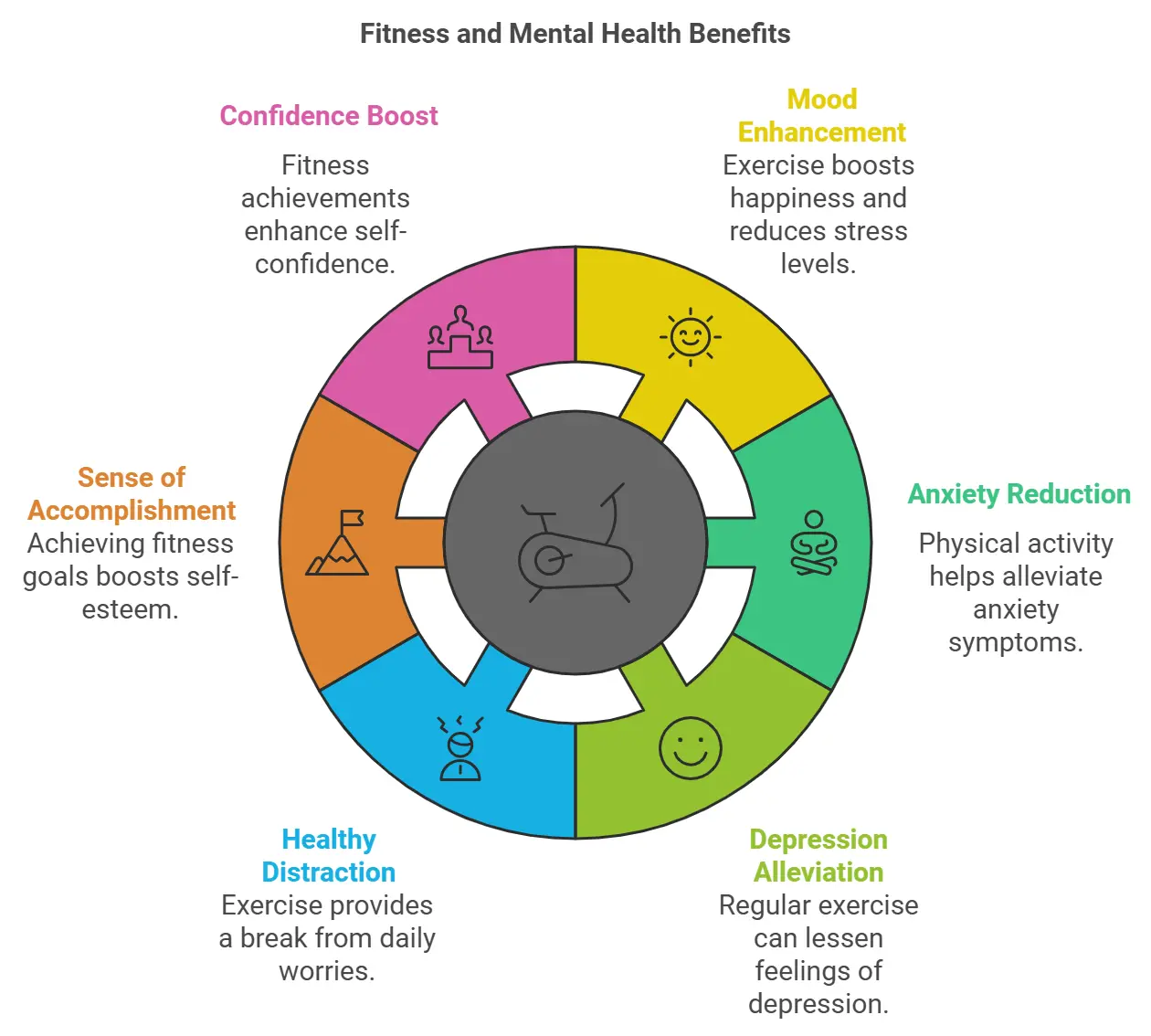
Have you ever felt that burst of happiness after a good workout?
Fitness and mental health are closely connected. When we move our bodies, we are not only get stronger physically but also boost our mood and reduce stress. It’s like giving your mind a natural pick-me-up!
Exercise also helps ease anxiety and depression. It provides a healthy distraction from worries and gives you a sense of accomplishment. Plus, reaching fitness goals can boost your confidence. Who wouldn’t feel great after hitting a new personal best?
It’s easy to remember to care for ourselves in our busy lives. But making time for fitness is like investing in your mental well-being. However it’s a walking on a block, a funny dance class, or a relaxing yoga session, staying fitted can make a big difference in how you feel.
So, are you curious about how fitness can improve your mental health?
Let’s dive into why fitness is essential for your mental health. Trust me, your mind and body will thank you!
1. Reduction of Anxiety and Depression Symptoms
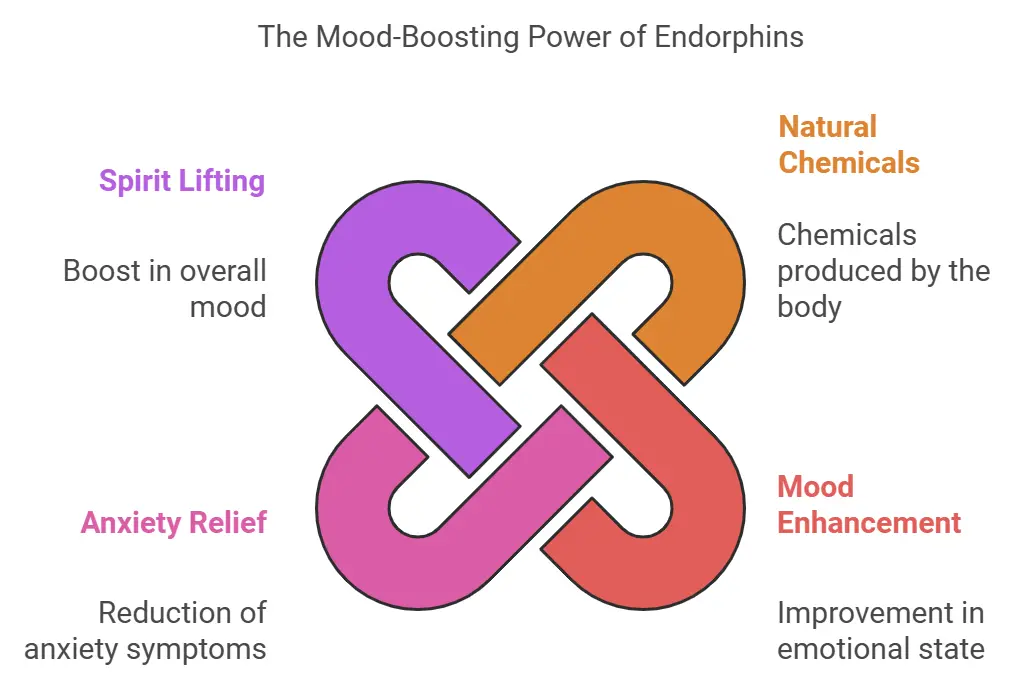
Endorphin Release: Your Body’s Mood Booster
When you exercise, your body produces endorphins. These are natural chemicals that make you feel happy and relaxed. It’s like getting a mood lift without any side effects! Have you ever noticed feeling better after a walk or a jog? That’s endorphins at work, easing anxiety and lifting your spirits.
Balancing Serotonin and Dopamine
Exercise helps to balance important brain chemicals like serotonin and dopamine. These neurotransmitters play a significant role in how we feel each day. When they’re balanced, our mood improves, and we feel more positive. So, regular exercise can help to keep these chemicals in check and reduce the symptoms of depression.
This is how fitness can reduce our feelings of anxiety and depression, which will significantly improve our mental health as well.
2. Stress Reduction
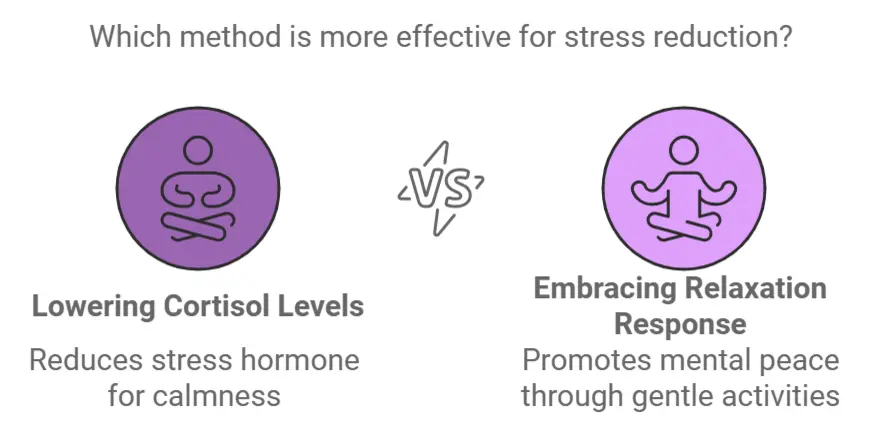
Fitness helps our body’s stress calm down. Let’s see how it happened.
Lowering Cortisol Levels
Regular exercise reduces cortisol, the stress hormone that makes you tense and overwhelmed. By lowering cortisol levels, you can manage stress better and feel calmer. Isn’t it amazing how a simple workout can bring such relief?
Embracing the Relaxation Response
Activities like yoga and tai chi promote a relaxation response in your body. They help calm your mind and counteract the fight-or-flight feelings that stress brings. Have you tried a gentle yoga class and felt the peace that follows?
3. Improvement of Sleep Quality
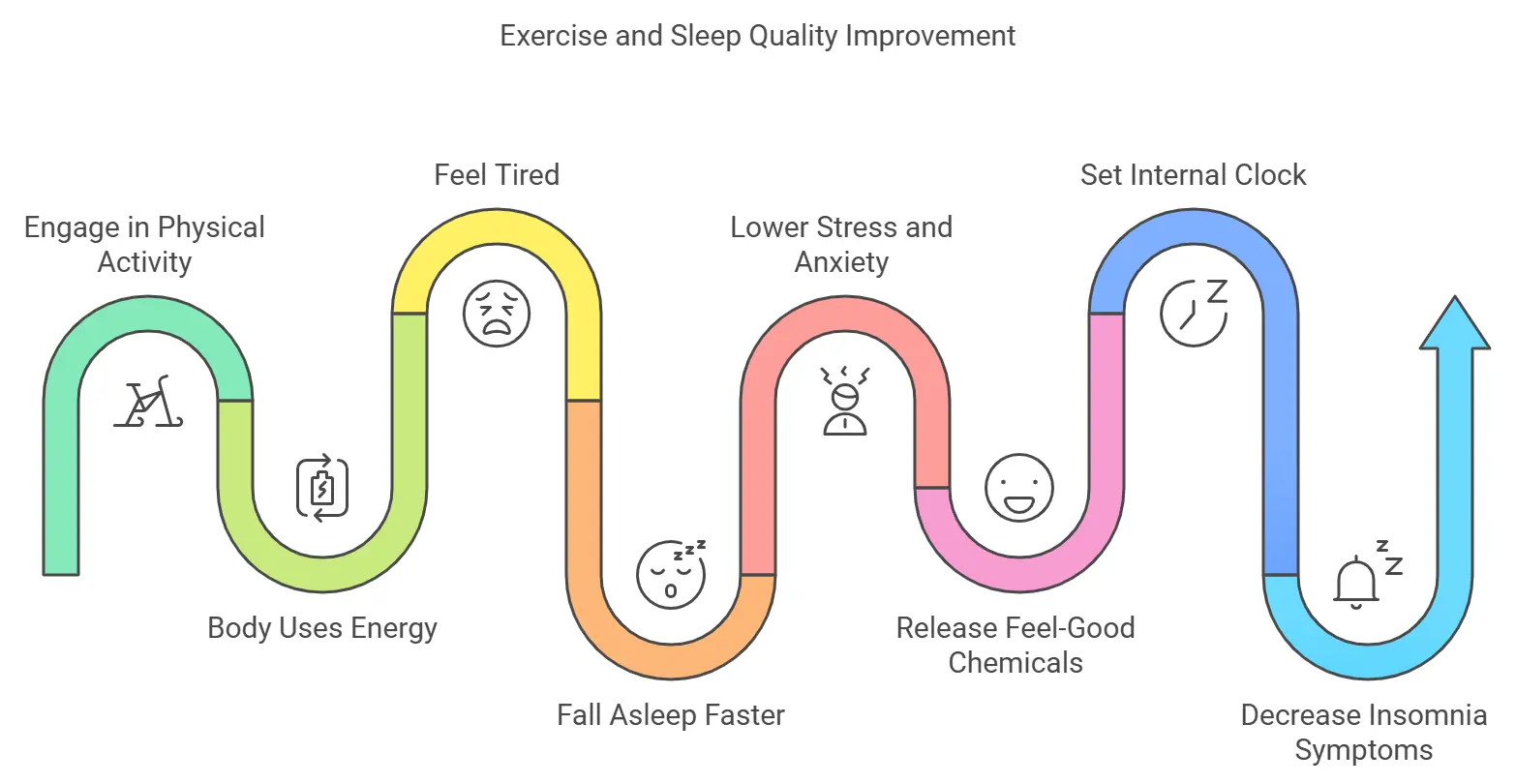
Getting enough good sleep is essential for feeling your best, and regular exercise can ensure your quality sleep. Because, when we exercise, our body uses energy, making us feel tired by the end of the day. This allows us to fall asleep faster at night.
Exercise also helps lower stress and anxiety, which can keep us awake. When we move our bodies, like running, biking, or walking, our brain releases “feel-good” chemicals. These chemicals help us feel more relaxed and calm, making it easier to sleep peacefully.
Plus, regular exercise can help you stay on a good sleep schedule. I’ve noticed multiple times that after a day with some activity, I fall asleep faster and wake up refreshed. Because when you exercise, it helps to set up your “internal clock” (also known as the circadian rhythm), which is your body’s natural sleep-wake cycle. This makes it easier to go to bed and wake up around the same time each day, which helps with getting good-quality sleep.
Exercise also helps to decrease symptoms of insomnia and other sleep disorders. Studies show that people who stay active tend to sleep deeper and longer. Imagine drifting into a restful sleep without tossing and turning!
So, if you want to sleep better, try adding some exercise to your day—even a little bit can make a big difference!
4. Enhancement of Self-Esteem and Self-Confidence
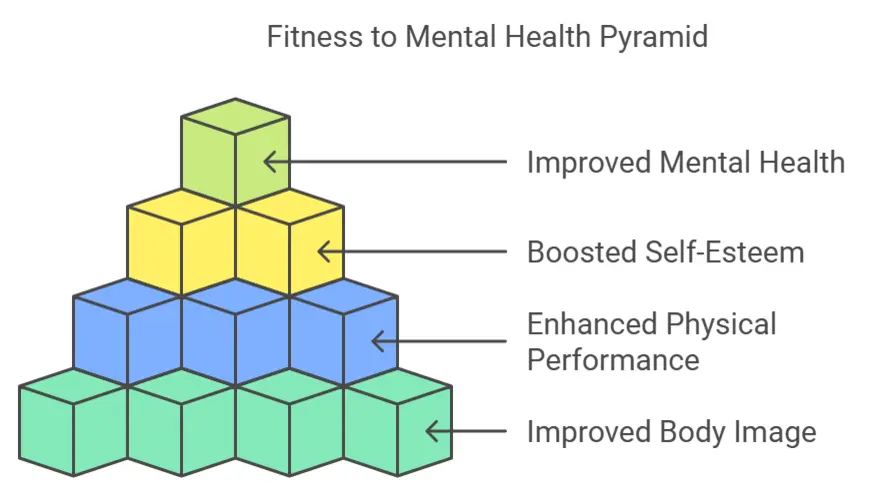
Fitness can significantly improve self-esteem and self-confidence. Which ultimately helps to improve our mental health. Here’s how:
Improved Body Image: Regular exercise is an excellent way to lose extra weight, build strong muscles, and increase energy levels. These physical changes can positively impact your body image and make you feel more comfortable in your skin.
Enhanced Physical Performance: As you get fitter, you’ll definately notice the improvements in your strength, endurance, and overall physical abilities. Achieving fitness goals will boost your confidence level and make you feel capable of accomplishing challenges.
If you can present yourself as fit, you can experience a positive impact on your self-esteem and self-confidence, which ultimately helps to improve your mental health.
5. Cognitive Benefits

Another reason to be fitted for improving mental health is improving cognitive benefits. Want to keep your mind sharp? Be attentive to your body fitness for mental health improvements.
Enhanced Memory and Concentration
Workout helps to increase blood flow to the brain, improving memory and focus. I have realized that when I stay active, I find it easier to concentrate at work or remember important details. I also notice I’m more alert after a morning jog.
How about you?
Promoting New Brain Cell Growth
Physical activity encourages the growth of new brain cells in the hippocampus, a region vital for learning and memory. Thus, staying active can literally help your brain grow stronger!
That’s why fitness is essential for boosting cognitive functions and positively impacting mental health.
6. Social Interaction Benefits
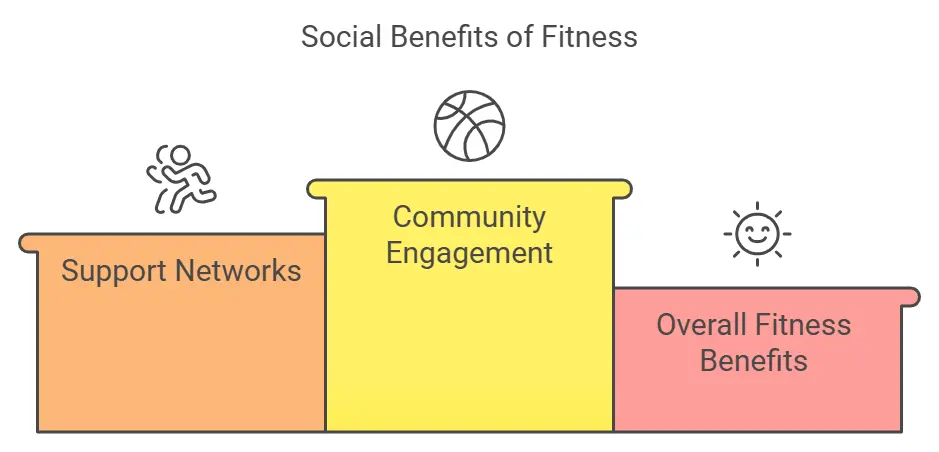
Are you feeling isolated lately? Try going out in the morning with friends or visiting a gym nearby. This can help you make new friends, stay healthy, and feel happier. Which ultimately helps to improve your fitness and mental health. Let’s make it clear how it will help;
Community Engagement: Building Friendships Through Fitness
Imagine joining a local basketball team or a dance class. Not only do you get a great workout, but you also meet people who share your interests.
Have you ever felt that camaraderie when working out with others?
Support Networks: Emotional Boost from Fitness Communities
Being part of a fitness community provides emotional support and motivation. When you surround yourself with like-minded individuals, they cheer you on and keep you accountable. It’s like having a built-in support system that lifts your spirits.
7. Enhanced Emotional Regulation
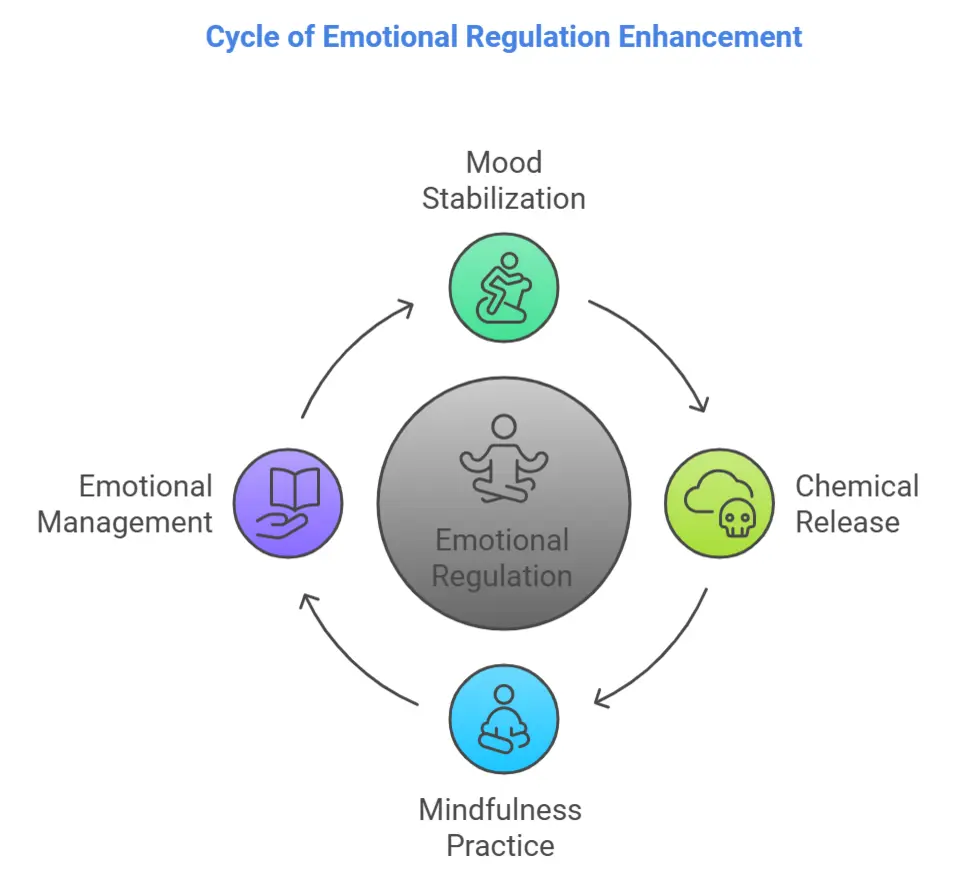
Regular exercise indefinitely helps you enhance your emotional regulation.
You probably thought, “How”?
Let me explain how fitness can enhance your emotional regulation to improving mental health.
Mood Stabilization: Keeping Your Emotions in Check
Regular activity helps stabilize mood swings and emotional responses. Exercise releases chemicals that promote a balanced mood. On days I work out, I’m less irritable and more patient.
You will also notice that when you start doing it regularly. Remember to share this experience with our social forums!
Mindfulness and Body Awareness: Staying Grounded
Exercises like Pilates and yoga increase mindfulness, helping you stay present. Focusing on your breath and movements brings awareness to your body and emotions, which helps you manage your feelings more effectively.
8. Improved Resilience to Stress
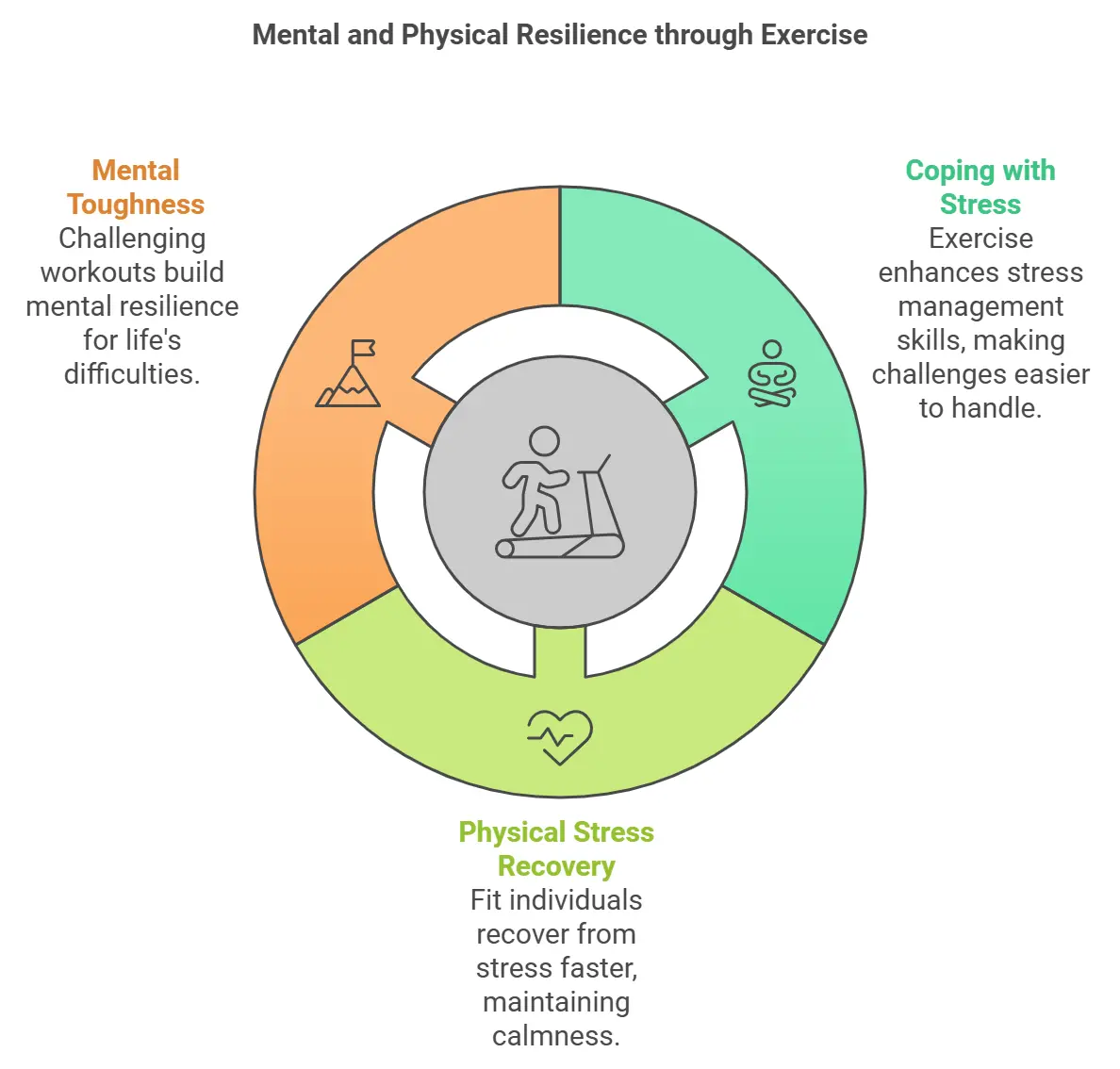
Life can be challenging, but mentally strong people can handle tough situations successfully. Cause, regular exercise will make you stronger, not just physically but mentally, too.
Learning to Cope with Stress
Fitness activities teach you how to deal with stress better. For example, pushing through a challenging workout makes you mentally tougher. When problems arise, you’ll feel more ready to face them. Isn’t it great to know you can handle challenges?
Training Your Body to Handle Stress
Exercise also helps your body to recover from stress faster. When you’re fit, your heart rate and blood pressure return to normal more quickly after stressful moments. This means you’ll feel calm and ready to move on sooner when stress happens.
9. Behavioral Activation
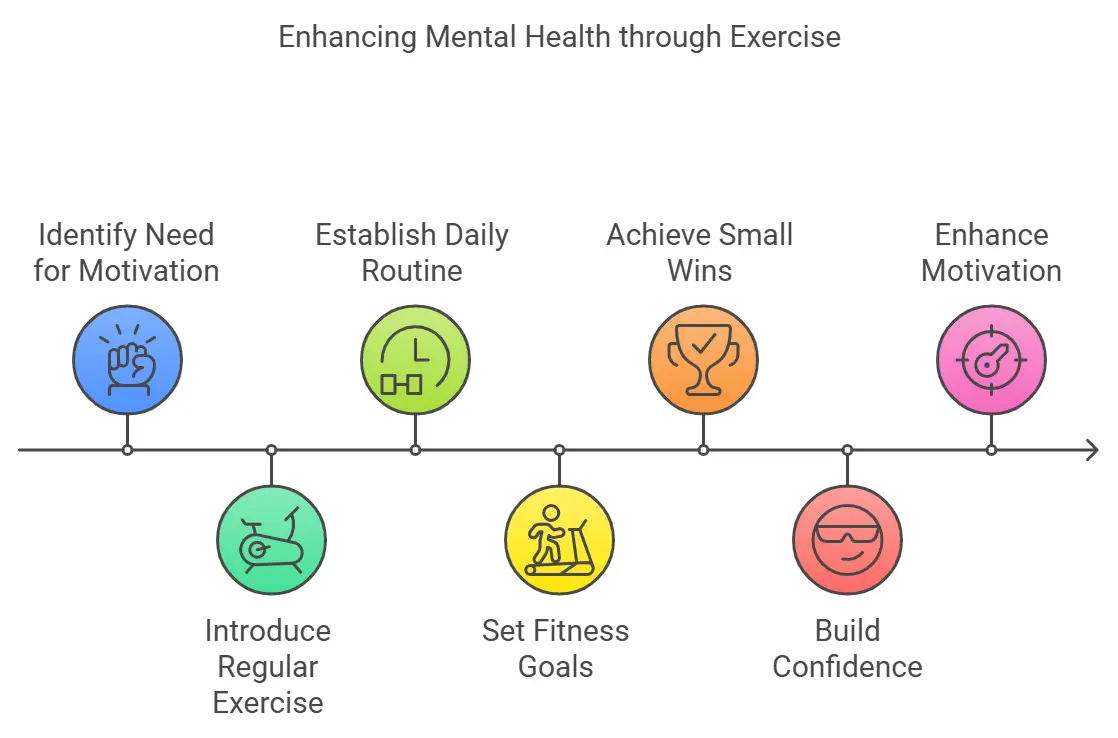
Do you ever feel stuck or need more motivation? One way to change that is to add regular exercise to your life. It can help you feel better physically and mentally, and you’ll start noticing positive changes over time.
Building a Routine: Breaking Free from Inactivity
A daily exercise routine can help you fight inactivity, often linked to feeling down. Having a set time to exercise gives your day structure and something to look forward to. For example, it became the best part of my day when I started going for morning walks. Have you considered how a simple routine like this could brighten your mood?
Setting Goals: Building Positive Habits
Fitness goals, like running a certain distance or learning a new yoga pose, can encourage healthy habits. You’ll feel proud and more confident each time you achieve a goal. These small wins make it easier to stay motivated and tackle other challenges in your life. Let’s try setting a fitness goal today and see how it makes you feel.
10. Distract Yourself from Negative Thoughts
Exercise is a great way to distract yourself from negative thoughts. When you work out, you need to concentrate on your tasks—like keeping your balance, counting your reps, or following dance moves. This focus leaves less room for worries or upsetting ideas.
Have you ever noticed how quickly time flies when playing a sport or riding your bike? That’s because your mind is busy with the activity, not with negative thoughts.
Being active positively engages your mind. Instead of thinking about problems, you learn new skills and push yourself to do better. This positive focus can help reduce stress and make you feel happier.
11. Promote Healthy Routines and Habits
Exercising regularly strengthens your body and helps you become more disciplined. Setting specific times for your workouts gives your day a steady rhythm. Planning my exercise routine helped me organize other tasks better. Do you think adding exercise to your schedule could help you manage your time more effectively?
Being active often leads to healthier choices in other areas of your life. Committing to staying active makes you more likely to eat nutritious foods and get enough rest. These healthy habits build on each other, helping you feel better overall.
So, by making regular exercise a habit, you’ll boost your fitness for mental health stability’s.
12. Boost Your Energy Levels
Do you ever feel tired halfway through the day? Regular workout will help you feel more energetic! When you stay active, your body delivers oxygen and nutrients to your muscles better, giving you more energy to do the things you love.
Exercise also improves your metabolism, allowing your body to release energy steadily. This helps you avoid those afternoon slumps when you might feel sleepy. Imagine having the power to stay active and alert from morning until night!
13. Enhanced Coping Strategies
Coping strategies are how we deal with stress, problems, or difficult feelings. Think of them as tools or methods that help us handle challenging situations. For example, if you’re feeling nervous about a test, you might take deep breaths to calm down or talk to a friend—that’s a coping strategy.
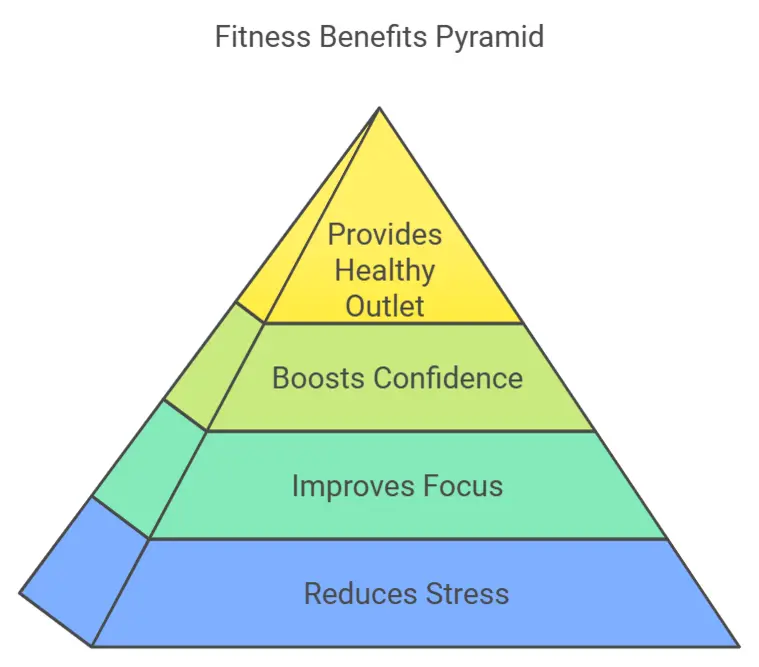
Exercise can improve these coping strategies. Here’s how staying active helps you handle challenges better:
- Reduces Stress: When you moving your body parts while exercising, your body releases “feel-good” chemicals called endorphins. These chemicals make you feel happier and more relaxed, which helps you manage stress more efficiently.
- Improves Focus: Physical activity can help you think more clearly. When your mind is clear, solving problems and making good decisions is more accessible.
- Boosts Confidence: Achieving fitness goals, like learning a new sport or improving your skills, makes you feel proud of yourself. This confidence helps you face challenges without feeling overwhelmed.
- Provides a Healthy Outlet: Exercise gives you a positive way to release feelings like anger or frustration. Instead of keeping these feelings inside, you can let them out through physical activity.
14. Promotion of Neuroplasticity: How Fitness Makes Your Brain Smarter and Happier
Neuroplasticity is your brain’s ability to change and grow by creating new connections between its cells. This process helps you learn new things, solve problems, and adapt to changes in your life. Think of your brain as a muscle that can become stronger and more flexible with the proper training.
How Fitness Improves Neuroplasticity
When you stay active, your brain gets a big boost. Exercise increases blood flow, delivering oxygen and nutrients that help brain cells grow and connect. It also releases special chemicals, like brain-derived neurotrophic factor (BDNF), which encourage the brain to build and strengthen these connections. This means regular fitness activities like running, swimming, or even dancing can improve your ability to focus, remember things, and develop creative solutions.
How Neuroplasticity Improves Your Mental Health
Neuroplasticity improves mental health by helping your brain adapt and grow, even during tough times. It allows your brain to form new connections, which enables you to learn, solve problems, and recover from stress or sadness. When your brain adapts, it becomes better at handling challenges like anxiety or depression. Neuroplasticity also helps you build positive habits and let go of negative ones.
15. Decrease in Chronic Pain
Regular movement can help manage chronic pain, often affecting your mental well-being. Activities like swimming or gentle stretching can ease pain and improve your mobility. Have you noticed how a light workout can make aches feel less intense?
When you exercise, your body releases endorphins. These natural chemicals act as painkillers, helping you feel better without medication. It’s like your own built-in relief system! Feeling less pain means you can enjoy life more and worry less. Which ultimately helps you stay mentally happy!
16. Boost in Immune Function
Your immune system is your body’s defense system, like an army that fights off germs and infections to keep you healthy. It’s always working to protect you but needs your help to stay strong.
Health and Wellness: Fighting Off Illness
Improved immune function means fewer sick days, which keeps your mind sharp and your mood steady. Regular exercise helps your body fight off infections more effectively. Imagine feeling strong and healthy, ready to take on the day without constant fatigue!
Holistic Well-being: Connecting Body and Mind
Physical health have a close connections to mental health. When you feel good physically, your mind follows suit. Regular fitness activities can lead to better nutrition and healthier lifestyle choices. It’s a positive cycle where taking care of your body nurtures your mind.
Boosting your immune system through fitness keeps you healthy and supports a positive and resilient mental state.
17. Prevention of Cognitive Decline
Worried about staying sharp as you age?
Regular exercise is connected to a decreasing the risk of cognitive decline in older adults. Walking, cycling, or gardening can keep your brain active and reduce the chances of developing Alzheimer’s or dementia. Have you felt more mentally alert after staying active?
Physical fitness supports overall brain health and longevity. Exercise helps to increasing the blood flow to the brain, which helps maintain its functions and delays age-related decline. Think of it as a workout for your brain, keeping it solid and efficient for years.
Preventing cognitive decline through fitness ensures that one’s mind stays sharp and one’s mental health remains robust as one age.
18. Improvement in Executive Functions
Want to make better decisions and stay organized? Try to focus on fitness for mental health improvements!
Exercise boosts your brain’s ability to plan, organize, and manage tasks. When you work out, your brain becomes more efficient at processing information. I remember setting a fitness goal and noticing how it improved my ability to prioritize tasks at work.
Physical activity also enhances your ability to control impulses and make thoughtful decisions. When you’re active, your brain develops better self-regulation skills. This means you’re less likely to make rash decisions and more likely to think things through. Imagine resisting that late-night snack because you went for a run earlier!
19. Alleviation of PTSD and Trauma Symptoms
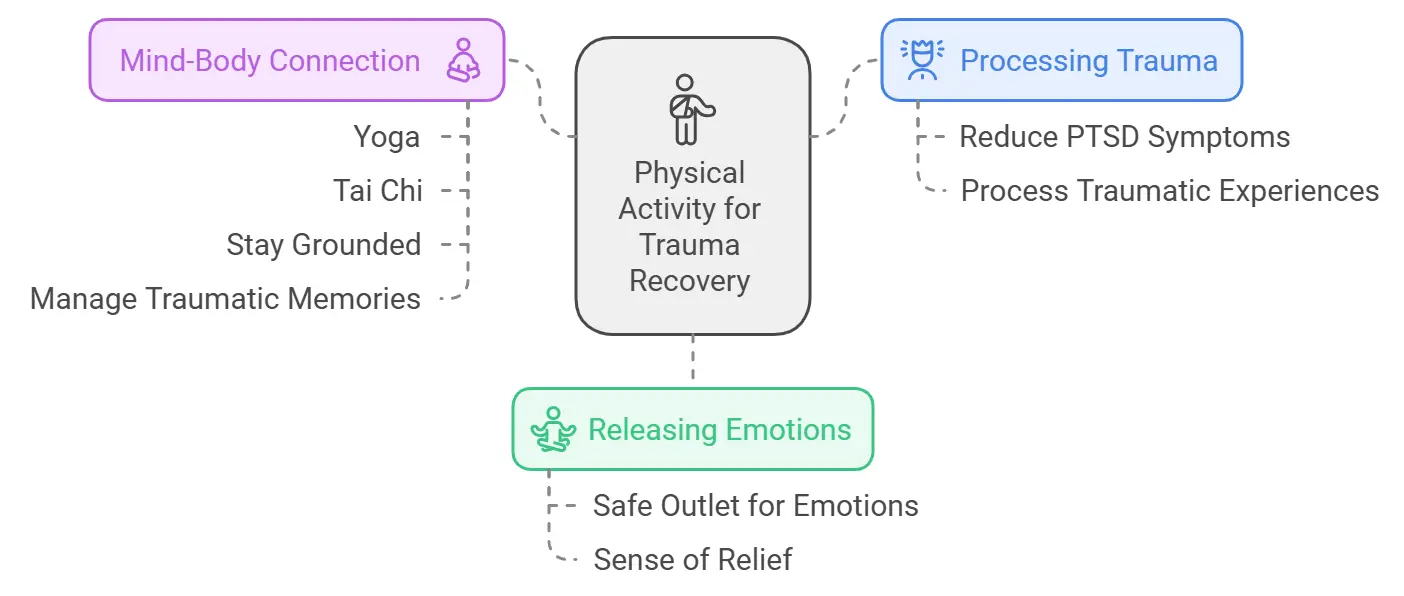
Dealing with trauma?
Physical activity helps process traumatic experiences and reduce PTSD symptoms. Engaging in exercise can provide a safe outlet for releasing pent-up emotions. Have you ever felt a sense of relief after a challenging workout? That’s your body working through trauma.
Remember, activities emphasizing the mind-body connection, like yoga and tai chi, are especially beneficial. These exercises help you stay grounded and present, making it easier to manage traumatic memories. Imagine feeling more in control and at peace after a calming yoga session.
20. Positive Impact on Mood
Sometimes, short bursts of exercise can lead to instant improvements in your mood. A brisk walk or workout releases endorphins, making you feel happier immediately.
Sticking to regular exercise routines can help you feel happier for longer. When you work out often, it keeps your brain chemicals balanced, reducing the risk of mood problems. Remember how following a workout plan can lift your spirits and keep your mind sharp!
Fitness plays a important role in maintaining a positive and healthy mental state by providing both immediate and sustained mood enhancements.
21. Reduction of Fatigue
Feeling constantly tired? Fitness can be your solution!
According to research from DoctorsFaculty, exercise helps reduce fatigue. We implemented this in two groups of people. One group consisted of regular exercisers, and the other did not exercise. We observed that the first group looked more charming and energetic than the second one.
Regular activity also boosts your overall energy levels by improving your stamina. When you engage in exercises like jogging or cycling, your body becomes more efficient at using oxygen and nutrients.
Let’s try exercising regularly for one week! Then, feel the difference yourself. I hope your body will thank you for staying active!
Exercise also enhances mental alertness and reduces feelings of mental fatigue. Activities such as brisk walking or light aerobics increasing the blood flow to the brain, helping you stay focused and attentive throughout the day. Imagine tackling your to-do list with a clear and sharp mind—thanks to staying active!
22. Encouragement of Healthy Brain Chemistry
Exercise increases the production of Brain-Derived Neurotrophic Factor (BDNF), which supports brain health and cognitive function. BDNF helps with the growth and survival of brain cells, enhancing memory and learning. Staying active and fit will make you feel more mentally sharp.
Looking to keep your brain in top shape? Then, you need to pay attention to improving your brain chemistry by staying fit with regular exercise.
Hormonal Balance: Keeping Your Mood Steady
Physical activity helps balance hormones like serotonin and dopamine, affecting mood and mental health. When these hormones are in balance, you experience better mood regulation and reduced feelings of depression and anxiety. Imagine feeling more emotionally stable and upbeat thanks to your fitness routine!
23. Promotion of Longevity
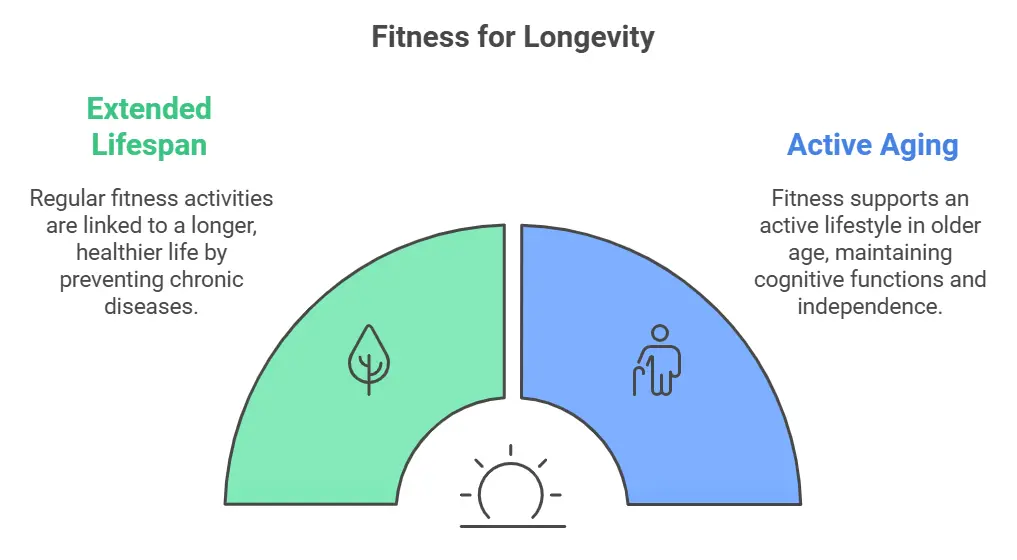
Hope you want to live a longer, healthier life!
Focusing on fitness for mental health improvements is necessary because it is crucial in promoting longevity.
Extended Lifespan: Living Longer and Stronger
Regular fitness is linked to a longer, healthier life. Staying active helps prevent chronic diseases and keeps your body functioning optimally. By staying consistent with your workouts, you will feel more vibrant and full of life because fitness contributes to your longevity!
Active Aging: Staying Independent and Mentally Sharp
Fitness encourages an active lifestyle well into older age, supporting mental health. Engaging in regular physical activity helps maintain cognitive functions and physical independence. Imagine enjoying your golden years with the energy and clarity to pursue your passions!
So, by staying fit and aging actively, you can enjoy a fulfilling and mentally healthy life for years to come.
How DoctorsFaculty Can Help You Boost-Up Mental Health
At DoctorsFaculty, we’re committed to enhancing your mental well-being through natural and practical solutions. Our dedication stems from a deep understanding of how physical health intertwines with mental health. We believe that everyone deserves to feel their best mentally and physically, and we’re here to support you every step of the way.
Dedicated to Improving Mental Health
Our team at DoctorsFaculty is passionate about providing resources that promote mental wellness. We offer personalized tips, remedies, and premium guides that empower you to take control of your mental health naturally. Whether you’re dealing with stress or anxiety or looking to improve your overall mental well-being, we’re here to help you navigate your journey with expert advice and supportive solutions.
How Can Our E-book “Stress Busting Guide” Help You Improve Mental Health?
Ready to take your mental health to the next level? Check out our E-book, “Stress Busting Guide”. This premium guide is packed with practical strategies and natural remedies to help you manage and reduce stress effectively without any medication. From easy-to-follow exercises to dietary tips that boost your mood, our E-book is designed to provide you with all the tools you need to overcome anxiety and enhance your mental health.
Download it today and start your journey towards a calmer, more balanced life. Let DoctorsFaculty be your trusted partner in achieving optimal mental health through natural and sustainable methods.
Conclusion
So, are you ready to take charge of your mental health? From understanding the science behind fitness and mental well-being to exploring the myriad benefits of staying active, it’s clear that fitness for mental health improvements is quite essential in your wellness arsenal. At DoctorsFaculty, we’re dedicated to providing you with the resources and support you need to thrive mentally and physically.
Don’t wait any longer to start feeling better. Embrace fitness as a natural solution for your mental health and discover the positive changes it can bring to your life. Remember, you’re not alone on this journey—DoctorsFaculty is here to guide you every step of the way. Let’s work together to achieve a healthier, happier you!



